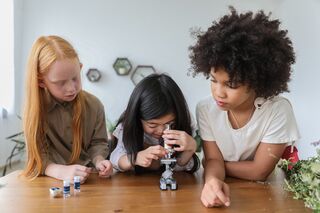Child Development
Pretending to Be Marie Curie Helps Girls Persist at Science
A new study finds role-playing improves girls' persistence in a science game.
Posted December 4, 2022 Reviewed by Lybi Ma
Key points
- Girls become less interested in science as they progress through childhood.
- By age 6, girls begin to believe that boys are more likely to be “really, really smart.”
- Pretend play could be a powerful way to help children cope with stereotypes.

Pretend play offers children a way to learn about the world and their place in it. When children play dress up or put on costumes, they’re exploring what it might feel like to have different sets of characteristics or how they might like occupying a specific role. In a recently published paper, researchers examined whether pretending to be a talented female scientist could encourage young girls to persist at a science-based task. Results suggested this type of pretend play could have a powerful effect on how girls approach science.
Although girls tend to do well in math and science classes, often earning higher grades than boys do in these subjects, girls become less interested in science as they progress through childhood. A 2011 study found that girls and boys had similar interests in science in early childhood, but by high school their science interests diverged substantially. At age 5, children don’t hold strong stereotypes about either sex being smarter than the other, but by age 6, girls begin to believe that boys are more likely to be “really, really smart.” Perhaps not surprisingly, researchers found that this belief extended to children’s behavior. Boys and girls were equally likely to be interested in playing a game described by researchers as being for “children who try really, really hard,” but girls were less interested than boys in playing a game described by researchers as being for “children who are really, really smart.” If girls don’t believe in their potential to be “really, really smart,” it’s no wonder that they might turn away from fields that seem to require that trait.
For this new study, researchers from Yale, Duke, and the University of Chicago recruited 240 children between 4 and 7 years old, who completed the study via Zoom. The children were randomly assigned to one of three different conditions before playing a science-based game with the researcher.
In the “baseline condition,” the researchers told children they were going to “be scientists and play a science game.” Researchers also explained the role of scientists: “Scientists explore the world and discover new things. An important part of being a scientist is making predictions.”
The “exposure condition” was the same as the baseline condition, except that the kids were also given information about a specific scientist before beginning the game. Girls were told about Marie Curie and boys were told about Isaac Newton. For example, researchers told girls in this condition, “Dr. Marie Curie is a scientist that discovered really important stuff about the world! What is special about Dr. Marie is that she always worked really hard, even when things got tricky. And when she made mistakes, or her predictions were wrong, she just kept on trying!” To make sure the children listened and understood, they were asked whether Dr. Marie worked hard and whether, when she makes mistakes, she gives up or keeps on trying. (For boys, the name was changed to Dr. Isaac.)

Finally, in the “role-play condition,” children learned about either Marie Curie or Isaac Newton, but were additionally asked to pretend to be that scientist during the game. Researchers referred to these children by the relevant scientist’s name while they played. For example, they would ask, “What’s your prediction, Dr. Isaac?”
The science-based game played by the children was designed to measure their persistence. Would a child keep going at the science game or choose to stop and move on to another task?
Children guessed whether different objects would sink or float in water in the game called “Sink or Float?” Girls and boys tend to be equally good at this game, guessing correctly over two-thirds of the time. After each “sink or float” trial, the children were asked whether they wanted to keep going with the game or do something else. Their persistence at the game was measured by how many trials they chose to play (up to 50).
Overall, the boys persisted longer at the “Sink or Float?” game. But when girls pretended to be a real scientist, that gap got smaller. Girls in this role-play condition ended up persisting similarly to boys in the baseline condition. Just learning about a female scientist was not enough to close the persistence gap. Only pretending to actually be a famous female scientist did the trick. For boys, the role-playing manipulation did not make a difference in how many trials they completed.
The researchers who conducted this study suggest that pretend play, something young children often already enjoy, could be a powerful way to help children cope with stereotypes. Just learning about role models who match your identity is a start, but may not be enough to change behavior. Using pretend play to help children actually put themselves in the shoes of role models may be a key step.

Role-playing may offer a relatively simple and inexpensive method of challenging young girls’ belief that they’re less likely to be “really, really smart” than boys. Parents, consider giving the princess dress and tiara a break and see how your daughter might like playing a scientist. Whether she becomes a scientist or not, persisting in the face of uncertainty or failure is a trait that will serve her well in life.


